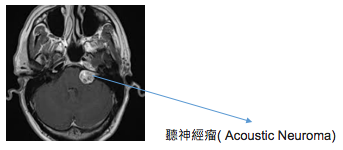
2016-08-12

Tinnitus, dizziness can be caused by Acoustic Neuroma!!
Case Sharing
65-year-old Mr. Hu has often suffered from neck pain three years ago. After physical therapy or massage, his condition has improved for a while. However, in the past six months, he have been experiencing neck pain, headaches, dizziness, tinnitus, hearing loss in the right ear, unstable gait, and a little paralysis of the left hand and feet. The patient was diagnosed with inflammation of the inner ear by the Otorhinolaryngology Department and was given anti-inflammatory and painkillers. After taking the medicine for two weeks, his tinnitus, headache and dizziness did not improve. After the author’s detailed examination and diagnosis, the condition may be related to the cervical spine or brain. Later, he went to a neurosurgeon to follow up on the patient’s condition. After MRI scans of the cervical spine, lumbar spine and brain, he discovered that the neck and lower back had moderate disc degeneration, and there was also a 2cm acoustic neuroma in the right internal auditory canal. (Intracanalicular acoustic neuroma), it is believed that this benign tumor caused the patient’s symptoms, and the patient later underwent surgery to remove the neuroma.
Acoustic Neuroma
Acoustic neuroma is a benign tumor, it usually grows slowly. A small acoustic neuroma does not cause any symptoms. However, if the tumor affects the vestibular nerve line (Vestibular Nerve), it will affect the patient’s dizziness and gait disturbance. If the tumor continues to grow and press on the vestibular cochlear nerve (Cochlear Nerve), this can cause tinnitus and hearing loss. If the tumor continues to grow, it can press on other parts of the brain and affect the function of the brain, which can be fatal.


Other factors that can cause
- The occupational environment is exposed to a noisy environment
- Neurofibromatosis Type II
- The head has been exposed to radiation
- Parathyroid Xenomatosis
Other Symptoms
It is mainly caused by the compression of the tumor to the cranial nerves. The 5th, 7th, and 8th cranial nerves may be affected.
- Vestibular cochlear nerve: the most common. The patient may have symptoms of hearing loss and tinnitus (95%)
- Trigeminal nerve: 17% of patients will have facial numbness, face sensitivity to sensory stimulation, or pain.
- Facial nerve: Only about 6% of patients will have facial muscle paralysis or even abnormal taste sensation.
- When the tumor is compressed to 9th, 10th, and 11th, there will be problems with swallowing and pronunciation of the brain nerves.
Data subject: Dr. Peng (neurosurgeon)

 Book an Appointment
Book an Appointment


